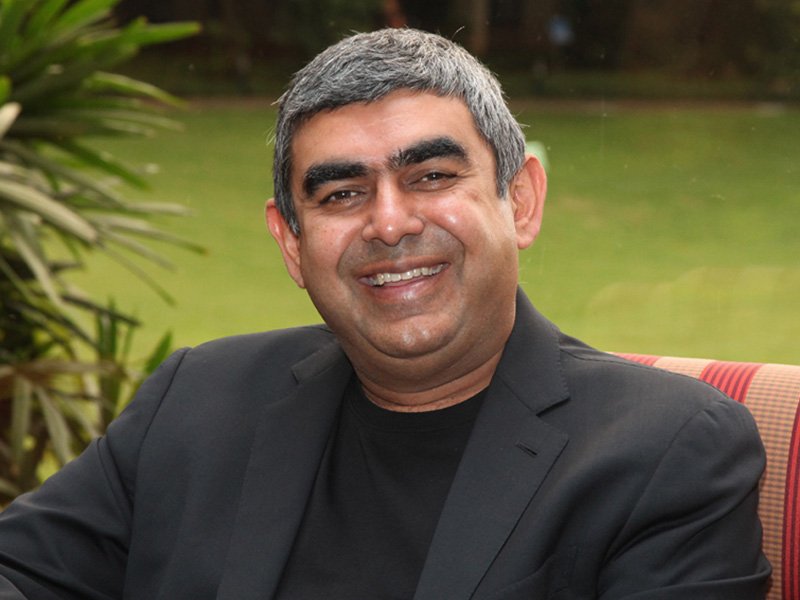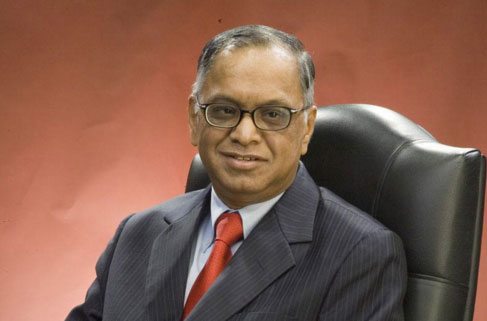Will Sikka’s resignation overshadow Infosys hire-American strategy?
The internal battle between Infosys co-founder N.R. Narayana Murthy and its Indian American CEO Vishal Sikka has finally culminated in the latter submitting resignation citing “continuous drumbeat of distractions.”
Sikka will serve as the Executive Vice Chairman of Infosys until March 2018.
Sikka joined Infosys in 2014 after his 12-year stint at the German software giant SAP. The same year, Murthy stepped down from his board position. There were early signals that the two tech stalwarts were not in good terms.
In his final email as the CEO of Infosys, Sikka wrote that his resignation is the result of the continuing personal attacks “amplified” by people within Infosys who he thought would extend steadfast support. It is clear that his resignation is the result of recent attacks that Murthy unleashed against him via media.
ALSO READ: Vishal Sikka resignation: Infosys lost its first ever Indian American CEO
A press statement from Infosys said that Sikka had all valid reasons to resign as he was under great pressure after attacks increased from different quarters, which it deemed as personal and negative, resulting in the management losing focus in transforming the company.
Murthy has been after Sikka for quite a while through his repeated attacks on the CEO’s corporate governance skill at Infosys. He was also unhappy with the executive pay of some of the employees of the company, including that of Sikka.
Last month, Yusuf Bashir, who had worked with Sikka at SAP, resigned from the position of managing director of Infosys Innovation Fund. Sikka brought in Bashir to Infosys’s Palo Alto campus in 2005.
Executive Vice President Ritika Suri, another SAP colleague of Sikka, resigned from the company in July.
Bashir and Suri were among the top-paid executives who joined Infosys from SAP after Sikka was appointed the CEO. In 2016, Sikka raked in $11 million in compensation. Suri earned around $800,000 in gross salary in FY 2017, according to the Economic Times. It has now become clear that the exorbitant salary package of the two executives had irked the co-founder.
Unlike his predecessors, Sikka was based out of Palo Alto. Media reports indicated that Murthy had issues with Sikka chartering private planes to meet clients, which he thought was creating an additional financial burden on the company.
ALSO READ: Full text of Vishal Sikka’s letter to Infosys employees announcing his resignation
With the stepping down of Sikka, Infosys has missed out on an opportunity to position itself as a US company. The United States is by far the company’s biggest market.
Appointment of Sikka had resulted in a paradigm shift in the functioning of India’s second-largest technology company. For the first time since its inception, the key operations moved to its Palo Alto office with Sikka making important decisions from the US.
The new arrangement gave Infosys an opportunity to better communicate with its overseas clientele – majority of whom are based out of the US.

Though the new working model was more convenient for clients, the founders of the company, who were based in India, felt losing authority in key decision making.
Bangalore has been the epicenter of Infosys’ offshore delivery of software services to North American and European clients. With more than 80 percent of the total workforce in India, the key decision making and clarification meeting were held just a few buildings across. But, with Sikka working from the Palo Alto office, things changed.
When Sikka was appointed as the CEO — the first-ever CEO from outside of the Infosys founding members, the company envisioned leveraging the capability of the company in mobile enterprise and cloud.
ALSO READ: Infosys’ new boss Vishal Sikka may operate from the US
Sikka, who is a Palo Alto resident, was familiar with the latest technologies and was sure to give the company a fillip, and as expected he made big strides in increasing the capabilities of Infosys in the area artificial intelligence and laid down Vision 2020.
Sikka’s experience in artificial intelligence, intelligent systems, programming languages and models, and information management helped him in envisioning the growth path for Infosys.
He understood the need to look forward beyond the H-1Bs. He once told in an interview that “I am myself a senior local hire — a US citizen!”
Sikka was of the view that Infosys needs to significantly embrace local talent. Hiring local talents have been one of his defined practices. Infosys, which has been facing criticism in the US for siphoning away American jobs, was slowly but steadily devising a new hiring policy in the overseas business. This practice, however, now stands disrupted with the resignation of Sikka.
With over 19,000 people working in the US, Sikka was working on a next generation visa-free global delivery model that was expected to bring collaborative technologies to create a rich experience for people to work together.



